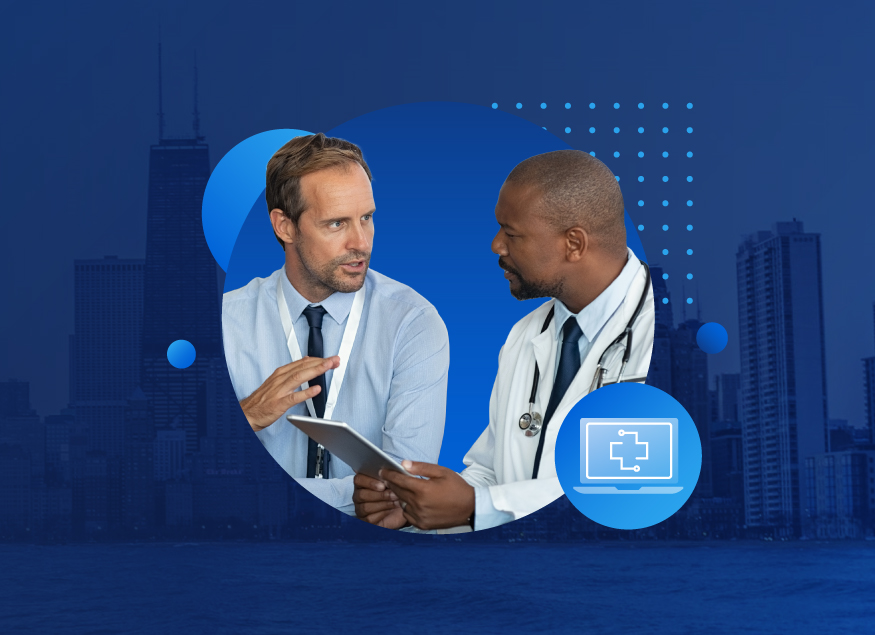At the 15th annual meeting of Becker’s Healthcare, providers and industry leaders gathered to discuss the latest in Health IT. Sessions explored intellectual capital, cybersecurity, logistics and technology, such as artificial intelligence (AI).
Carahsoft and its partners, such as Oracle, Bamboo Health, Innovaccer, Laserfiche, Smart Communications, Wolters Kluwer and more, attended Becker’s to connect healthcare systems with the latest technology.
Becker’s Healthcare conference featured five key themes for attendees to learn about.
Expanding Patient Care Through Automation
Speakers from Baptist Health discussed patient care amidst high demand in the session “Empowering Healthcare Teams: Baptist Health’s Journey to Efficiency.” As the Baptist Health Healthsystem began examining inpatient flows, they tracked all components of the patient’s experience. The influx of patients exposed existing weaknesses, such as fragmented operations, low visibility and discharging delays, resulting in lost revenue and overall inability to meet patient demand. In response, Baptist Health opened a command center to centralize its logistics, proactively taking steps to increase reliability and predictability. Viewing all components of a patient’s stay, from the moment patients entered to being fully discharged, as well as the time spent cleaning the room, enabled them to find and remove bottlenecks that prevented the efficient transfer of patients. Baptist Health also began automating workflows to expedite processes. Automated texts would be pushed to providers when patients were not moved, allowing providers to know where they were needed. These changes resulted in a 6% increase in overall admissions and a 50% increase in on time or early discharges by 11am, which helped free up beds, increasing overall capacity and revenue.
Patient-Centered Sustainability
In the session “The Future of Patient-Centered Care: Strategies for Sustainable Healthcare,” Fariha Siddiquie, the Director of Healthcare Services at The Kaleidoscope Group, emphasized that patients are the center of healthcare. When crafting a positive customer experience, healthcare systems should take a holistic approach to the patient’s journey.

Healthcare systems can foster a positive experience by:
- Utilizing front desk staff to create positive experiences as soon as patients enter the facility
- Providing a comfortable experience in the waiting room
- Removing technical jargon to help patients and their support system understand billing, procedures and treatments
- Preventing and slowing the spread of diseases through community outreach
Meeting patients and their support systems at their level contributes to patients feeling safe and welcome. While providers are not fully responsible for the experience a patient has at a healthcare center, they shoulder the most responsibility. Healthcare systems can help alleviate this responsibility by fostering a culture of empathy between employer and provider, which will ultimately extend to provider and patient. Focusing on the patient’s experience will ensure satisfaction in all aspects of patient care.
To meet all of a patients’ needs, providers should consider how different backgrounds, such as geographical location and age, factor into care needs. With technology, certain features, such as specific fonts or options to connect to a help desk, boost accessibility. When these features are not included, the technology that already has been invested in will be ineffective. By committing to a strategic plan that impacts day-to-day workflow, healthcare systems can ensure a more welcoming, fostering environment for patients.
Choosing the Right Technology for Your Healthcare Systems
As IT expenses continuously grow, healthcare systems must consider which technology to prioritize. In the session “From Friction to Flow: Advocating for Smarter, Safer Healthcare Systems,” panelists discussed how healthcare systems must consider whether replacing existing technology with new ones is cost effective. Before purchasing, healthcare systems should consider how the technology will be incorporated into the workplace, and whether staff will need to be trained to use the new technology. Talking to front line caregivers and other staff can illuminate what solutions and tools are needed for daily operations. The technology with the best return on investment is that which alleviates monotonous administrative tasks and uplifts providers, who face potential burnout from the administrative tasks placed on top of their job. Once the technology is in place, healthcare systems should measure the outcomes of technology and gather and listen to feedback from end users. While technology helps processes, it cannot automatically solve problems. Rather, technology is best utilized when aiding providers and expediting work processes, allowing clinicians to focus on patient care.
Preventing Data Breaches in Healthcare
In the session “Doing the Inevitable: How Health Systems Are Stopping Data Breaches,” speakers from various institutions discussed the daily phishing breach attempts that healthcare systems face. Phishing attacks are insidious as they are impossible to fully prevent. Threat actors are getting more sophisticated with social engineering, using AI to impersonate leadership over the phone, or even on video calls. While security solutions, such as multi-factor authentication, are important to preventing breaches, there are use cases where they are not applicable- such as emergency situations in the operation room.
Phishing breaches should be treated as a “when,” not an “if;” systems must proactively prepare for data breaches. Attacks can force an area or unit to go offline, so a response strategy can help operations continue smoothly. Trainings that simulate breaches can demonstrate to leaders the full complexity of these attacks and what is at risk. Even breaches for agencies that are indirectly exposed to your network can be a hazard. To prevent phishing breaches, everyone from providers to clinical leadership must be knowledgeable about mitigating attacks.
Optimize Daily Operations with Artificial Intelligence
In the session “AI in Healthcare: Big Ideas and Risks for the Next 5 Years,” speakers Dr. Chris Longhurst from UC San Diego Health, Dr. Mike Phepher from Stanford, the Chief Data Officer from CommonSpirit Health and Mohan, the Founder and CEO of LeanTaaS, discussed the variety of AI projects have been tested in healthcare systems to aid with operational processes. With the onboarding of secure AI portals, healthcare systems enable staff to experiment and learn how to use the new technology.
They have found that AI can aid daily procedures in numerous areas, such as:
Operational Tasks
AI can help eliminate monotonous tasks that are not directly related to helping patients, such as with calls and removing duplicate insurance requests, empowering providers with more time with patients.
Safety
AI has helped predict which patients need palliation. This early identification has enabled symptom relief, disease prevention and reduced mortality rate. It has also democratized medical information, empowering patients and providers, as well as aided in eliminating misdiagnosis.
Patient Empowerment
AI has enabled patients to learn more about the care they receive. Tools such as language learning models (LLMs) have helped providers craft response letters to patients, and electronic health record (EHR) integration aids in provider-patient communication by making medical information more accessible to patients.
When choosing the right AI platform for a healthcare system, the speakers recommend onboarding an AI model that is secure and sufficient for necessary procedures. A platform approach can help avoid siloing. Technology experts, such as VMWare, are constantly working to be at the forefront of AI initiatives and enablement, and Salesforce offers a variety of AI tools. Overall, AI can be used in many scenarios. Between aiding call centers and predicting illnesses, AI increases efficiency, optimizes processes and decreases costs.
By maintaining security and investing in mission-supporting technologies, healthcare systems can support providers and offer the best care to patients.
To learn more about technologies featured at Becker’s Healthcare Online, visit Carahsoft’s healthcare technology portfolio.








